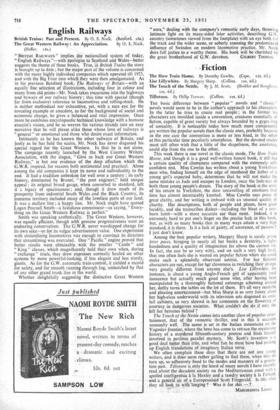Fiction
Tillotson. By Philip Trower. (Collins. los. 6d.)
THE basic difference between " popular " novels and " classic " novels would seem to be in the author's approach to his characters. In the latter he tries to create real people ; in the former his characters are moulded inside a convention, creatures essentially of fiction, capable of great variety but always bounded by a gyges ring of unreality.. It is noticeable today how much more competently are written the popular novels than the classic ones, probably because in the one case the convention is more or less fixed, in the other at this particular. time peculiarly amorphous. But the devoted reader must still often wish that a little of the shapeliness, the assurance, could slip from the one to the other. - This week there is one novel in the classic mode, The Slow Train Home, and though it is a good well-written honest book, it still has a certain quality of clumsiness compared with the extremely self- confident rest. Miss Cowlin has written about a young Yorkshire- man who, finding himself on the edge of manhood the father of a young girl's expected baby, determines that he will not make the same mistake as Jude and escapes to London, once the lode-star of both these_ young people's dream. The story of the book is the story of his return to Yorkshire, the slow unravelling of emotions that time has almost inextricably knotted. Miss Cowlin uses prose of great clarity, and her writing is imbued with an unusual quality of charity. Her descriptions, both of people and places, have great lucidity, and she transcribes dialect—including the bleat of a new- born lamb—with a more accurate ear than most. Indeed, it is extremely hard to put one's finger on the precise lack- in this book, but, as with so many books that in many ways attain a very high standard, it is there. Is it a lack of gaiety, of assurance, of passion ? I just don't know.
Among the-best popular writers, Margery Sharp is surely prima inter pares, bringing to nearly all her books a dexterity, a light handedness and a quality of imagination far above the current rut. In fact, she can be so very witty, and on such a very high level, that one often feels she is wasted on popular fiction when she could make such a --splendidly. observant satirist. For her fictional characters are not, except for her cleverness in twitching their strings, very greatly different from anyone else's. Lise Lillywhite, for instance, is about a young Anglo-French girl of apparently total innocence but actually much good sense who, after having been manipulated by a thoroughly fictional entourage scheming around her, deftly turns the tables on the lot of them. It's all very readable and pleasing entertainment—but Miss Sharp is so very funny about her high-class underworld with its television sets disguised as cock- Jail cabinets, so very shrewd in her comments on the flowering of courtesy in dangerous societies. What_ couldn't she do if only she left her heroines behindI
The Touch of the Nettle comes into another class of popular enter-
tainment, that of the romantic thriller, and in this it succeeds unusually well. The scene is set in the Italian mountains on the Yugoslav frontier, where the hero has come. to retrace the. mysterious history of a murdered fifteenth-century poetess and finds himself involved in perilous parallel mystery. Mr. Scott's invention is a good deal, better than trite, and what fun he must have had making
up English translations of imaginary Italian verse. _
We often complain these days that there are not any young writers, -and it does seem rather galling to find them, when they do turn up, so adhesively fixed to the modes and manners of a genera- tion past. Tillotson is only the latest of many novels I have recently read about the decadent society on the Mediterranean coast with a spoiled intelligentsia a la Huxley and a tawdry society -a la Firbank and a general air of a Europeanised Scott Fitzgerald. Is this what they all look to with' onging ? Was it for this —? _
MARGHANITA LASKI.


































 Previous page
Previous page